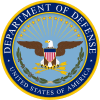
The Council on Foreign Relations (CFR) is an American think tank specializing in U.S. foreign policy and international relations. Founded in 1921, it is an independent and nonpartisan nonprofit organization. CFR is based in New York City, with an additional office in Washington, DC. Its membership has included senior politicians, numerous secretaries of state, CIA directors, bankers, lawyers, professors, corporate directors and CEOs, and senior media figures.

The Hoover Institution is an American public policy research institution that promotes personal and economic liberty, free enterprise, and limited government. While the institution is formally a unit of Stanford University, it maintains an independent board of overseers and relies on its own income and donations. Fellowship appointments do not require the approval of Stanford tenure committees. It is widely described as a conservative institution, although its directors have contested its partisanship.

The Defense Science Board (DSB) is a committee of civilian experts appointed to advise the U.S. Department of Defense on scientific and technical matters. It was established in 1956 on the recommendation of the second Hoover Commission.
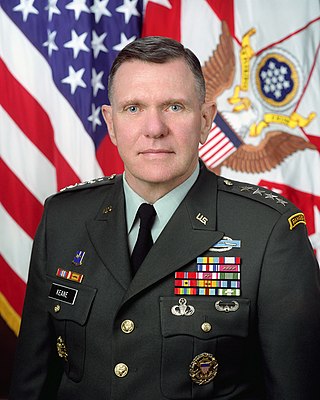
John M. "Jack" Keane is a former United States Army general who served as Vice Chief of Staff of the United States Army from 1999 to 2003. A recipient of the Presidential Medal of Freedom, he is a national security analyst, primarily on Fox News, and serves as chairman of the Institute for the Study of War and as chairman of AM General.

David Harold McCormick is an American politician and businessman. McCormick served as the CEO of Bridgewater Associates, one of the world's largest hedge funds, from 2020 to 2022.
Membership in the Council on Foreign Relations comes in two types: Individual and Corporate. Individual memberships are further subdivided into two types: Life Membership and Term Membership, the latter of which is for a single period of five years and is available to those between the ages of 30 and 36 at the time of their application. Only U.S. citizens and permanent residents who have applied for U.S. citizenship are eligible. A candidate for life membership must be nominated in writing by one Council member and seconded by a minimum of three others.
Raymond Francis DuBois Jr. is a private consultant in national security and defense policy and also a senior adviser at the Center for Strategic and International Studies, a nonpartisan think-tank in Washington, D.C. At CSIS he focuses on international security policy, civil-military relations, defense management reform, and Joint Professional Military Education. His expertise is in Defense Department organization, management and reform; land forces tactical and non-tactical systems; international and domestic installations and environmental issues; base realignment and closure; National Guard and Reserves issues; stability operations and reconstruction; continuity of business operations and crisis management. He was a member of the Defense Health Board and its NCR BRAC Health Systems Advisory Committee in 2006 to 2009. DuBois was a member of the Bipartisan Policy Center’s Commission on Stabilizing Fragile States. He is a member of the International Advisory Council of the United States Institute of Peace, a member of the Princeton University ROTC Board of Directors. He has spoken at the Maxwell School of Syracuse University, at the European Forum Alpbach 2008 in Austria, at the Marine Corps University, Quantico, Virginia, and before audiences of the National Defense Industry Association and the Association of the United States Army.

The National Space Council is a body within the Executive Office of the President of the United States created in 1989 during the George H. W. Bush administration, disbanded in 1993, and reestablished in June 2017 by the Donald Trump administration. It is a modified version of the earlier National Aeronautics and Space Council (1958–1973).

The Defense Business Board in the United states was established in 2001 as a complement to broader transformation efforts in the Department of Defense to move from an overly burdensome bureaucracy to a more streamlined, effective organization. The Board consists of approximately twenty private sector executives with experience in business management. The purpose of the Board is to provide independent advice, which reflects an outside private sector perspective, on best business practices for application to the Department. The Board’s objective is to enhance the efficiency and effectiveness of organizational support to the nation's warfighters.
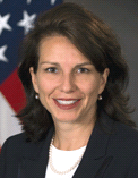
Mary Beth Long is an American foreign policy expert, entrepreneur, and former U.S. Government official. From 2007–2009, Long served as the first woman confirmed by the U.S. Senate as an Assistant Secretary of Defense, and as such, was the first female civilian four-star military equivalent in the history of the Pentagon. She led the International Security Affairs (ISA) office in the Office of the Secretary of Defense responsible for policy for the Middle East, Europe, and Africa. She was also the first woman ever to be appointed as Chair of NATO's High Level Group (HLG), the highest-level responsible for NATO's nuclear policy and reporting directly to the Secretary General of NATO.

Anthony Jean Tata, is an American retired United States Army officer, author, and government official. He is a retired brigadier general of the United States Army (1981–2009), and later served as a school district administrator for two large school districts in the District of Columbia and North Carolina. He served as Secretary of Transportation of North Carolina from 2013 to 2015 under Governor Pat McCrory. Tata is the author of the Threat series of thriller novels.
Joshua Daniel Whitehouse is an American politician who served as a member of the New Hampshire House of Representatives for the town of Farmington from 2014 to 2016.

Planning for the presidential transition of Donald Trump, led by then vice president-elect, former governor Mike Pence of Indiana, began before Donald Trump won the United States presidential election on November 8, 2016, and became the president-elect. Trump was formally elected by the Electoral College on December 19, 2016. The transition was formerly led by Chris Christie until he and a number of his supporters were replaced or demoted on November 11. The results were certified by a joint session of Congress on January 6, 2017, and the transition ended when Trump was inaugurated at noon EST on January 20, 2017.

David L. Norquist is an American financial management professional and former government official who served as the 34th United States deputy secretary of defense from 2019 to 2021. In May of 2022, Norquist was selected as the president and chief executive officer of the National Defense Industrial Association (NDIA).

Mark Thomas Esper is an American politician and manufacturing executive who served as the 27th United States secretary of defense from 2019 to 2020. A member of the Republican Party, he had previously served as the 23rd U.S. secretary of the Army from November 2017 to July 2019.
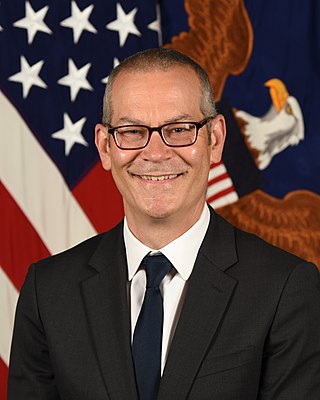
Colin Hackett Kahl is an American government official and academic who served as under secretary of defense for policy in the administration of President Joe Biden from April 28, 2021, to July 14, 2023. Previously, he served as national security advisor to the vice president under then-Vice President Joe Biden (2014–2017). After the Obama administration, Kahl served as a Steven C. Házy Senior Fellow at Stanford University.
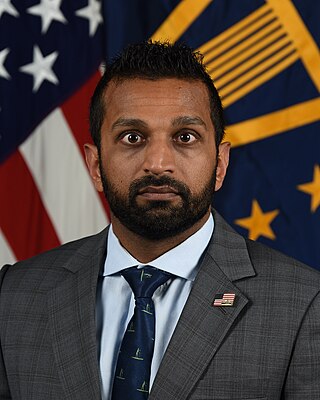
Kashyap Pramod "Kash" Patel is an American attorney, children's book author, and former government official. He served as chief of staff to the acting United States secretary of defense under President Donald Trump. A member of the Republican Party, Patel worked at the National Security Council and United States House of Representatives and was previously a federal public defender, a federal prosecutor working on national security cases, and a legal liaison to the United States Armed Forces.
In April and May 2020, United States President Donald Trump dismissed the inspectors general (IGs) of five cabinet departments in the space of six weeks. The inspectors general removed were Michael K. Atkinson, Intelligence, on April 3; Glenn Fine (acting), Defense, April 7; Christi Grimm (acting), Health and Human Services, May 1; Mitch Behm (acting), Transportation, May 15; and Steve Linick, State, May 15. In four of the cases the announcement was made late on a Friday night in a classic Friday news dump. In several cases the fired IGs had taken an action which Trump disliked, so that the dismissals were widely described as retaliation. In two other cases, questions were raised about whether the dismissals related to ongoing IG investigations into the conduct of the cabinet secretary in charge of that department. The cumulative firings were often described as a "purge" or as a "war on watchdogs".

Christopher Charles Miller is an American retired United States Army Special Forces colonel who served as acting United States secretary of defense from November 9, 2020, to January 20, 2021. He previously served as Director of the National Counterterrorism Center from August 10 to November 9, 2020. Before his civilian service in the Department of Defense, Miller was a Green Beret, commanding 5th Special Forces Group in Iraq and Afghanistan, and later spent time as a defense contractor.















